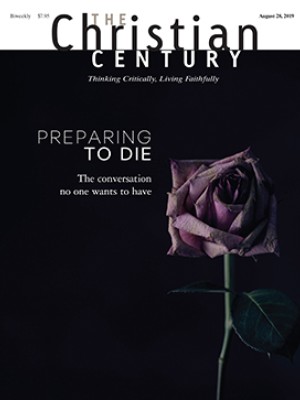Too busy for church? Churches offer some online remedies
Dallas residents Lincoln and Natalie Redmon spent two years bouncing from church to church. After marrying and moving to the city, they just couldn’t find the right fit. So late last year Lincoln Redmon wrote down a goal: “Find a home church or have God answer that prayer in a different way.”
Two days later, he saw an Instagram post from Judah Smith, lead pastor of the northwestern multisite ministry Churchome. “We have a new location,” he said in a video post. “And that location is everywhere.” Smith announced Churchome’s new app, bringing pulpits and pews into pockets and palms.
Read our latest issue or browse back issues.
The Redmons logged on. Soon, they started a local watch group—now with almost 60 members. Every Sunday, about 25 people visit their house and live-stream a service together.
“It makes you feel like you’re still a part of a local church even though you’re using technology,” Natalie Redmon said, adding that the app changed their definition of church itself. “When we wake up every day we think everything is church. So if we’re going shopping at the grocery store or if we’re driving our car and we’re singing worship music, all of that means church.”
The Redmons’ experience is increasingly the norm: call it “church gone mobile.” For many, digital tools are just the latest innovation in church history, no different than cathedrals or the printing press.
A 2016 study from Pew Research Center said nearly 60 percent of adults under 30 used the Internet while searching for a new church, compared with just 12 percent of adults older than 65. Online services at Life.Church, one of the country’s largest online ministries, have recorded more than half a million unique visitors, says Lori Bailey, communications director. Their Bible app, YouVersion, is approaching 400 million downloads.
“The online is the new front door of the church,” said Ed Stetzer, executive director of Wheaton College’s Billy Graham Center.
This digital shift comes at a particularly vulnerable moment for US religion. Gallup recently reported that church membership fell 20 percent in the past 20 years. A 2016 Pew study found that just half of Americans attend church once or twice a month. Nones are America’s fastest-growing religious group.
At the same time, the Pew research found that about half of those attending less frequently said their biggest obstacle was “practical difficulties,” such as work or travel. If some shrinking of congregations stems from people’s busyness rather than lack of belief, these churches hope the convenience of church online could help boost attendance.
Online churches are not without their critics, many of whom worry that technology allows people to keep religion at arm’s length. Laura Turner criticized the impersonal aspects of online churches last year in an opinion piece for the New York Times.
“A lot of churches seek growth at all costs,” she said in an interview. “For a lot of these churches, they’re trying to expand their imprint—and almost their brand—by creating apps, by putting services online, by counting their online campuses. And that comes, I think, at a real cost of having in-person community.”
If Christians find themselves too busy for Sunday service, Turner said, they shouldn’t change how they attend church—they should lead a less-busy life.
Others, like Stetzer, support online ministry but still think church is done best in person. “My avatar always looks happy,” he says. “On my Instagram, I’m living my best life every day. So the challenge is if that’s not true, we need someone to weep with us and to laugh with us.”
But supporters of online ministry argue that in-person attendance doesn’t always promote community. Mark Venti, executive pastor of central ministries at Churchome, says people can easily slip in and out unseen in stadium-sized buildings. The anonymity enabled through the Internet actually allows many to better connect online.
In order to grapple with declining attendance nationwide, Venti and others at Churchome are trying to make their ministry “more addictive.” He wants to give church the same accessibility that makes him buy too much on Amazon. But that goal, he says, brings a new entrepreneurial mindset. Pastors listen to God; startups listen to the consumer.
“We’re not in Silicon Valley nor are the people that we’re partnering with developer-wise, but it’s definitely changed our world,” said Venti. “And so we’re going to [ask] how can we use that mentality and those tools to help the church too.” —The Christian Science Monitor





